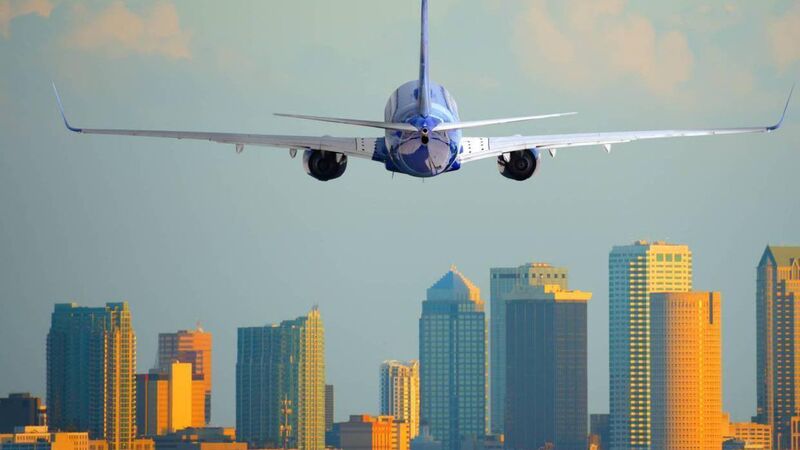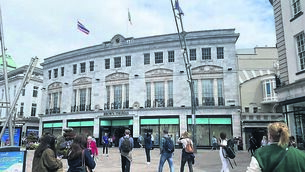Catherine Conlon: Sorry, tourists, an aviation tax is only way to cut emissions

The climate may be spiralling out of control and ecosystems collapsing before our eyes, but the vast majority of us will block our ears to that whispering message in our brain - telling us as we book our cheap flights that we are part of the problem.
Director General of the International Air Transport Association (IATA), Willie Walsh, does not appear to be concerned about the impact of rising emissions from aviation on climate. He said recently that it was “total madness” that Dublin Airport is held back by the passenger cap.
“They’ve invested in building additional runway capacity they cannot use because they have a cap on the numbers of passengers,” he added.
No recognition here of the ‘madness’ of the airline industry brandishing its sustainability credentials because emissions on a passenger basis are down, while ignoring the reality that emissions on an absolute basis are up, and will continue to rise exponentially as long as we continue to push for increasing passenger capacity.
The first outlined that Ireland is projected to achieve a reduction of just 23% in total greenhouse gas emissions by 2030, compared to the national target of 51%. The latest data predicts none of the biggest emitting sectors - including transport, agriculture, buildings and energy – will meet 2030 legally binding targets.
In a second report, the , the EPA identified the stark reality of what not achieving climate targets means to Ireland, with more than 100 key risks to the State posed by climate change, with extreme wind, coastal erosion, and flooding among the biggest threats, with impacts that can cascade across the economy.
Meanwhile, we block our ears and continue to drive our SUVs, eat what we want, invest in bigger and better homes, shop for new clothes on impulse, and listen to politicians when they tell us to feed the growth machine and drive the economy as we spend, waste, and throw away.
But, more than anything else, we fly. Malaga for a weekend, London for a concert, Ibiza for a stag, Tuscany for a wedding, Liverpool for a football match, Australia for a Lions tour, South Africa for some winter sun.
We are more likely to hop on a flight than jump on a train, and much less out of pocket.
Christopher de Bellaigue, author of , outlines how air travel is responsible for about 3.5% of the warming impact caused by humans. In absolute terms, it is low only because a fraction of the people on the planet fly and it is rarely essential.
“The majority of people who take planes do so not for vital work or family reasons but in order to have fun at the other end,” he writes.
“Aviation has a strong claim to be the most damaging leisure activity around,” concludes de Ballagiue.
For those of us who worry about the impact of all those air miles on climate change, Ryanair’s chief financial officer, Neil Sorahan states the company has ‘very aggressive targets’ between now and 2031 to reduce CO2 per passenger per kilometre. To date, CO2 per passenger per kilometre ‘has come down from 67g to 66g’.
So, emissions per passenger per kilometre are dropping marginally while passenger numbers are rising exponentially, boosting economic growth and airline profits.
Ryanair passenger numbers were almost 80 million in 2012 and 200 million in 2024. The 2024 Ryanair sustainability report predicts a traffic of 300 million passengers by 2034, ‘delivering freedom for the citizens and visitors of Europe to fly’.
Researcher at the Oxford Martin Programme in Global Development at the University of Oxford, and Lead Researcher at Our World in Data, Hannah Ritchie, summed it up in a paper for Our World in Data.
‘If demand has quadrupled, but aviation has become twice as efficient, then emissions will double.’
To meet climate targets, absolute emissions must contract – not double.
Airlines and aviation authorities are blindsiding us with data on improved efficiencies, but increasing global demand is leading to higher emissions.
CEO of Ryanair Michael O’Leary has commented previously on climate change as ‘complete and utter rubbish’.
In an interview with the last year, O’Leary called sustainable energy fuel (SAF) ‘a wheeze’ and expressed his lack of faith in the whole project by claiming there ‘isn’t enough cooking oil in the world to power more than one day’s aviation’.
This is just one of a litany of comments from O’Leary.
Ryanair was ranked as the tenth most polluting company in Europe in 2019 and no amount of greenwashing is going to alter that.
The Government’s notes: “It is widely acknowledged that deployment of sustainable aviation fuels will play the greatest role in decarbonising the aviation sector in the short to medium term.”
But there is no clear technological solution to achieve this, according to Dr Cormac O’Raifeartaigh, lecturer in physics at the South East Technological University.
“I have never seen evidence for an alternative,” he said in April last year, adding that the age of the electric or hydrogen powered large commercial airliner is considered decades away.
What about SAF? O’Raifeartaigh said there are plenty of problems about any dependence on biofuels to power planes. “The arable fields you are using (to grow the crops) may be needed to feed the world,” he said.
There is one viable alternative.
Environmentalist John Gibbons has proposed that aviation should be taxed in the same way as other forms of transport. Each person should be allocated a fixed distance, such as 1,500km a year – the distance of a typical return flight to Europe. The next flight could attract a levy of €200 which doubles each additional round trip - €400, €800, €1,600 and so on.
Business, environment academic and author of Fly And Be Damned (2012), Peter McManners wrote that “the rich world’s expectations of flying are so deeply ingrained that, on the route to a sustainable society, aviation policy is the most difficult nut to crack”.
An aviation tax that impacted most heavily on those flying most often, would be a logical and pragmatic solution to a government committed to both climate targets and the expansion of the economy. The tax would defray people from taking jaunts across the globe without factoring in the significant cost to their pocket as well as the escalating costs to ecosystems and climate stability.
Dr Catherine Conlon is a public health doctor in Cork.







 App?
App?




